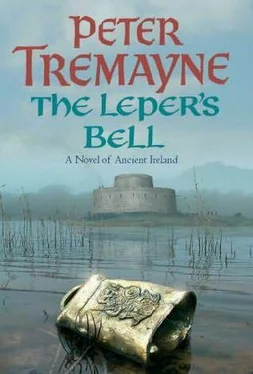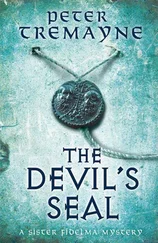Peter Tremayne - The Leper's bell
Здесь есть возможность читать онлайн «Peter Tremayne - The Leper's bell» весь текст электронной книги совершенно бесплатно (целиком полную версию без сокращений). В некоторых случаях можно слушать аудио, скачать через торрент в формате fb2 и присутствует краткое содержание. Жанр: Исторический детектив, на чешском языке. Описание произведения, (предисловие) а так же отзывы посетителей доступны на портале библиотеки ЛибКат.
- Название:The Leper's bell
- Автор:
- Жанр:
- Год:неизвестен
- ISBN:нет данных
- Рейтинг книги:4 / 5. Голосов: 1
-
Избранное:Добавить в избранное
- Отзывы:
-
Ваша оценка:
- 80
- 1
- 2
- 3
- 4
- 5
The Leper's bell: краткое содержание, описание и аннотация
Предлагаем к чтению аннотацию, описание, краткое содержание или предисловие (зависит от того, что написал сам автор книги «The Leper's bell»). Если вы не нашли необходимую информацию о книге — напишите в комментариях, мы постараемся отыскать её.
The Leper's bell — читать онлайн бесплатно полную книгу (весь текст) целиком
Ниже представлен текст книги, разбитый по страницам. Система сохранения места последней прочитанной страницы, позволяет с удобством читать онлайн бесплатно книгу «The Leper's bell», без необходимости каждый раз заново искать на чём Вы остановились. Поставьте закладку, и сможете в любой момент перейти на страницу, на которой закончили чтение.
Интервал:
Закладка:
Again the herbalist looked at his wife.
‘Corbnait insisted that I make an inquiry. She became worried later. No, the man did not bring the child here. But those mountain passes are the gateway to a great peninsula which is the land of the Corco Duibhne. Perhaps the man took the child there.’
Eadulf suppressed a deep sigh. Then a thought occurred to him, and he stood up with an impatient gesture. His next step was clear. Perhaps the steward at the abbey of Coimán would be able to identify the leper who was a lord in this territory. Eadulf stared sternly at the herbalist and his wife.
‘Let me tell both of you this fact. I have no authority in this kingdom, although I am husband to the lady Fidelma of Cashel. You may know that she is a dálaigh and highly respected by the Brehons of the five kingdoms of Eireann. We speak not only of my child but of hers, and she is sister to Colgú who rules this kingdom. Whereas I accept your story and believe that you acted in all innocence, it may be that you also acted in greed. You say you thought you were giving the baby up for its own future well-being. I shall say this to you … it is a matter that still has to be argued before the Brehons of Cashel. I cannot compel you to do anything. But if you were to ask my advice as to what you should do now, I would tell you this. Return to Cashel, ask for Fidelma, and if she is not there ask for Colgú the king himself and tell either one your story. Tell them neither lies nor embellishments. The truth must be told. You will not lose by telling that truth.’
The herbalist looked nervous. ‘Will you be there to speak for us?’
‘God willing, I shall be,’ answered Eadulf determinedly. ‘But first I have to find this leper lord and retrieve my son.’
He turned, and taking his horse he walked slowly to the gates of the abbey.
It was but a few moments before he was admitted to the chambers of the rechtaire , the steward of the abbey. He was a pleasant man, anxious to help once he knew Eadulf’s status and influence.
‘We are loyal to the primacy of Imleach, Brother. Bishop Ségdae, who holds the pallium of the Blessed Ailbe, patron of all Muman, is our guide. How can we help you?’
‘Evil has befallen Cashel,’ Eadulf began, but to his surprise the steward nodded.
‘News travels quickly, and bad news travels faster than a plague. We have known of the disappearance of the lady Fidelma’s child — your child,’ he hastened to add, ‘for over a week.’
‘Did the herbalist and his wife bring you this news?’ asked Eadulf thoughtfully.
The steward made a negative gesture.
‘Some messenger from Cnoc Loinge brought it, I think. But you refer to the travelling herbalist and his wife who camp outside the abbey? They seem to take no interest in anything, although the man recently asked me if a baby had been brought into the safe care of this abbey, at which I told him no.’
‘Did he mention anything else?’
The steward was looking thoughtful.
‘Do you suspect them of abducting the child?’ he asked. ‘Why, I…’
Eadulf shook his head. ‘They were the engine by which the child was brought into this part of the country, Brother Steward,’ he said, ‘but it was, I believe, by accident. I do not think that they knew the identity of the child.’
The steward was shaking his head. ‘Well, they have kept their own counsel, whatever it is.’
‘The herbalist did not ask about a lord in this land, one who called himself “lord of the passes” and seemed physically impaired to some extent?’
The reaction was surprising. The steward reared back in his seat and actually crossed himself.
‘You obviously know this person,’ Eadulf observed sharply.
The steward swallowed hard.
‘There is only one who fits that description. Uaman the Leper. Uaman, son to Eoganán. Eoganán was the prince of the Uí Fidgente who was slain at Cnoc Áine a few years ago.’
Eadulf groaned aloud.
Chapter Thirteen
The Well of the Oak Grove was a pleasant little vale that Fidelma had known from childhood. It was a spot where she and her best friend Liadin, who had grown up to be her anam chara , used to play. Fidelma felt a quick pang of anguish as she thought about her soul friend. If only Liadin had not tried to involve her in her murderous plot against her husband and child. The law was supposed to be about rehabilitation of the wrongdoer, about forgiveness, for was it not said that everyone has some means of redemption in them? Yet Fidelma could find no way of forgiving her friend for her betrayal of her.
Some centuries before in the five kingdoms, when somebody was thought beyond redemption and refused to work for the welfare of the clan to restore his honour and pay the necessary reparation to his victims, then, reluctantly, the old Brehons were left with no other course than to put the wrongdoer in a boat, give him water and food for one day, and tow him out of sight of land, casting him adrift to be left to the mercy of the wind and the waves.
The old storytellers told that such a wrongdoer had been named MacCuill, an unrepentant thief and murderer who dwelt in the land of Ulaidh. The Brehons had duly cast him adrift. But the wind and tide washed him ashore on an island sacred to the old ocean god, Mannánan Mac Lir. Having survived, he saw the error of his ways, converted to the New Faith and ended his days as a bishop on the island. And the people of the island had since called him ‘blessed’ and prayed for his spiritual intercession in their affairs. In Fidelma’s eyes, the story was told merely to demonstrate that even in those who were perceived as the worst of criminals there existed a hope of rehabilitation even when they were thought to be beyond redemption.
She returned her mind to her surroundings.
It was an idyllic spot. A thick oak wood spread itself through the vale and a tiny stream sang its way through the centre of the trees and crossed a clearing. To one side of this clearing rose a log-built hunting lodge, constructed for the kings of Muman so long ago that it was not recorded exactly when. The woods around were the habitation of good game, of wild deer, boar, pigs and other animals, and the stream carried trout as well as princely salmon.
It had become a tradition for the kings of Muman to place a brugaid , a lodge keeper, there for such times as the king and his friends decided to use its facilities. In winter no one would be using the place, but Fidelma knew that Duach, the lodge keeper, would be there anyway. She could send his son Tulcha to Cashel with her message. She crossed the stream and halted before the lodge.
‘Duach! Tulcha!’ she called.
The buildings looked deserted. No one came out.
Could Duach have deserted the hostel? One heard many things in Cashel and she knew that Duach had been here just a few months ago. She had known him since she was a little girl; surely someone would have mentioned if Duach had left her brother’s service. She slid from her horse and stared up at the shuttered windows and closed doors.
She called again.
This time she caught the soft sound of the blowing of a horse in the stable building, impatiently expelling air through its nostrils. Her own mount caught the sound, twitching its ears and stamping a forefoot.
Frowning, she walked to the stable door and tried it. It swung open and she glanced inside. There were four horses there and she noticed, curiously, that three of them looked strangely familiar to her.
‘Duach? Tulcha?’ she called again.
One of the horses appeared skittish, a little nervous. It moved backward, kicking up the straw. As the stalks fell away, she caught sight of a human foot and lower leg. Eyes wide, she moved forward.
Читать дальшеИнтервал:
Закладка:
Похожие книги на «The Leper's bell»
Представляем Вашему вниманию похожие книги на «The Leper's bell» списком для выбора. Мы отобрали схожую по названию и смыслу литературу в надежде предоставить читателям больше вариантов отыскать новые, интересные, ещё непрочитанные произведения.
Обсуждение, отзывы о книге «The Leper's bell» и просто собственные мнения читателей. Оставьте ваши комментарии, напишите, что Вы думаете о произведении, его смысле или главных героях. Укажите что конкретно понравилось, а что нет, и почему Вы так считаете.











